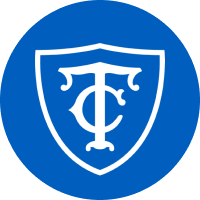"Hello, World!"
Introducing Teachers College Digital Collections
After successful migration of the library services platform, Alma powered by Primo VE and the Canvas integrated platform for Course Resource Lists, we are pleased to announce the soft launch of Teachers College Digital Collections. This blog post describes in detail the collaborative Alma Digital project, an initiative that began in May 2022, with a focus on the migration of collections from Pocket Knowledge, the homegrown digital archive, to their new home in our catalog, Educat+. We highlight our rationale for choosing Alma Digital, extensive preparation work, project timeline, interesting challenges, and needs ahead, as we feature examples of select historical and archival collections. The Alma Digital project is our most ambitious technology project to date, and one that serves to strengthen library resources and services; better meet the needs of our patrons; and encourage best practices in the organization, description, and accessibility of collections now housed together in the integrated library services platform.
COLLABORATION AND TEAM
The planning, implementation, and continued success of the Teachers College Digital Collections, as hosted by Alma Digital (ExLibris), could not be possible without the support and collaboration of the following professional librarians and staff of Teachers College, including Jon Macmillan, Director, Program Management Office, TC Information Technology, Kalliopi Mathios, Head of Technical Services and Metadata Librarian, Tim Conley, Web Services and Systems Librarian, Conrad Lochner Special and Digital Collections Librarian, and Jennifer Govan, Library Director and Senior Librarian.
RATIONALE
As part of Gottesman Libraries Mission, Vision, and Values, we are consistently looking forward to emerging and innovative trends in librarianship, while also building on established practices that have served many generations of our scholarly community. The services offered to our members and affiliates, such as reader services, interlibrary loan, reference and research workshops and consultations, course resource lists, front-desk assistance, and the availability of collaborative spaces, all reflect a dedicated effort to provide the resources aiming to inspire and support our patrons.
In keeping with this mission, many technical and technology-related developments take place behind the scenes. Gottesman Libraries staff routinely perform data-driven assessments and evaluations to see where we can enhance user-experience and overall library services. The continued effort to further integrate our collections for more efficient and effective search, discovery, and access has been one such area.
With the introduction of our digital collections, via the Alma Digital Ex Libris platform, patrons now have the capability to discover and access Teachers College digital collections all in one location. The integration of digital collections will compliment and bolster our already robust holdings of print and electronic resources, streaming video, and open-access resources, providing users with a more well-rounded search and discovery experience.
Stages of Implementation
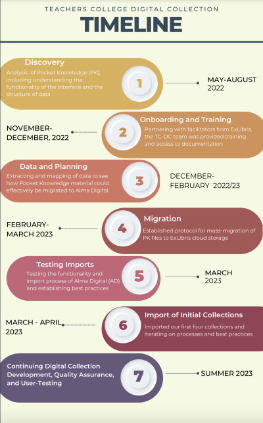
PREPARATION WORK
As with the implementation of any new platform, an immense amount of preparation work was necessary in order to establish and prioritize not only stages, goals, and milestones, but also to anticipate potential difficulties and encumbrances.
Over the years, Pocket Knowledge (PK) introduced popular components of web 2.0 practices, such as crowdsourcing and user-generated content, including the capability to create tags for natural language navigation and uploading personal files. This provided users with the capability to share course specific material, as well as a method to share project materials with cohorts.
In order to incorporate elements of Pocket Knowledge design and functionality, it was essential to understand the interaction between recent content and legacy collections. The analysis and research included examining past iterations of Pocket Knowledge, constructing paper prototypes of the PK site structure and tagging, and collaborating with the Teachers College IT Project Management Office on extracting data and files from PK’s database.
While PK provides a separate discovery experience for users, integration was previously attempted by providing links to PK resources in the library database’s corresponding bibliographic record. With the Libraries’s migration to Alma in 2021, these links were less easily accessible in the new discovery interface. Additionally, existing bibliographic records for special collections posed potential reconciliation and merging challenges as we welcomed PK data and content into the library system for the first time. We used current and established best practices to ensure that data extracted from Pocket Knowledge mapped accordingly to existing bibliographic records currently available in our holdings. Additionally, rules of normalization, import processes, and essential documentation practices were prioritized and tested.
In parallel with analysis of Pocket Knowledge and Alma data, we researched the original acquisition, ascension, and finding aid records of the physical collection. This effort allowed us to re-establish the arrangement and provenance of digitized collections. The Special and Digital Collections Librarian along with Library Associates audited and compared the content of physical collections with digitized material. This is an ongoing process which will assist in prioritizing future digitization and potential knowledge gaps in collections.
The collaborative effort of Gottesman librarians and TCIT Project Management Office created a professional environment, bringing together each member's respective talent, expertise, and creativity to proactively assess and synthesize the components and information necessary for the implementation and migration of Pocket Knowledge to Alma Digital.
FINDING POSITIVE SOLUTIONS
Migrating a custom-tailored platform to an industry standard presents a unique set of challenges. Several areas provided points of contention that required creative thinking and work-arounds in this particular project. The implementation of Alma Digital and migration of Pocket Knowledge has proven no different, however our team were able to loosely plan contingencies for the unknown and create positive solutions with equally positive outcomes.
Three specific areas became the focus of our attention early in the project:
- Bulk Migration of Files from Pocket Knowledge Cloud Storage to Alma Digital Cloud Storage
As the early stages of the project hinged on the ability to effectively and efficiently migrate over 171,000 files from one platform to another, our team had to address the implications of the file structure implemented in the structure of Pocket Knowledge. This stage required many in-depth meetings with support staff both within Teachers College as well as Ex Libris in order to better understand the requirements and capabilities of the migration and Alma Digital.
In order to migrate—and then make available for import—the many files from PK, we discovered that the over 171,000 files had to be un-nested from the parent folders that contained them. This required that there be a flattening of the folder/file hierarchy in bulk. Teachers College Developer Teams wrote Python scripts to extract individual files from these folder hierarchies, essentially creating a single folder with the items and elements necessary for migration.
Once the necessary scripts had been written, the files were then copied—and the originals preserved—within Pocket Knowledge’s AWS-S3 bucket and made available for Ex Libris to copy into their AWS-S3 bucket. Once this was completed, we were able to begin addressing methods of importing digital files from the ExLibris AWS-S3 into Alma Digital. Upon recommendation, Cloudberry Explorer—a cloud file manager—provides a user-interface for the access, transfer, and management of files across local and cloud storage. This software allows direct access to our AWS cloud directory and allows for imports into Alma Digital that exceed the limits of Alma’s internal digital uploader.
- Data formatting and mapping from one platform to another
Upon import of digital objects into Alma, a unique bibliographic record is generated. In order to ensure that duplicate records would not be created—thereby creating a deluge of redundant and confusing holdings— we needed to determine what items in Pocket Knowledge had corresponding bibliographic records already existing in our EDUCAT+ holdings. However, Pocket Knowledge data had not been formatted utilizing MARC field identifiers, nor were there consistent MARC fields that related back to Pocket Knowledge items. Through careful data gathering and manipulation we determined that there were approximately 24,000 PK items with existing bibliographic records, which we were able to match, in some cases by title, reformatting in Open Refine and then utilizing V-Look-Up functions in Excel..
One example of utilizing this mapping concerned our large historic dissertation collection. Numbering over 10,000, the historic dissertations provide an important resource for Teachers College and its affiliates, as well as the wider scholarly community via interlibrary loans. We discovered that a majority of the historic dissertations had data in three disparate sources: ProQuest Digital Dissertations and Theses, EDUCAT+, and Pocket Knowledge. Starting with bibliographic records with links to PK and stored in the physical collection’s Closed Stacks Dissertations location, we used OpenRefine to split the title field and isolate the title proper. Then, we completed the same title transformations with the dissertations presented in PK in order to match the physical representation with its digitized counterpart in Pocket Knowledge. Once a first round of matches were made, we took the remaining unmatched dissertations and performed the same matching routine against our ProQuest Digital Dissertations and Theses collection. The remaining unmatched material ended up having been mis-tagged as part of historic dissertations in PK, and were removed from the import process.
- Collection Organization
By virtue of Pocket Knowledge incorporating elements of both a crowd-sourced tagging system and elements of ontological organization system, we needed to develop a cohesive understanding of how various metadata tags related not only to each other, but also how this facilitated multi-level relationships between content at both the item level and collection level.
This required a close examination of the information architecture of the site and utilized methods traditionally used in user-experience evaluations and human-computer interaction. We compared data and information from legacy data available in our library records to high-level (premium) tags, analyzed and attempted to reduce the number of premium tags associated with each top-level legacy collection, and reasserted a more traditional taxonomic structure that helped provide an essential understanding of how the digital collections would be structured on the new platform.
The deep understanding of the knowledge organization of both Pocket Knowledge and Gottesman Libraries Legacy Collections provided the foundational information to parse out and extract the vital collections and associated objects from nearly 612,607 files, and over 58,000 total tags, many of them duplicates that existed independently with each tag associated with them. Utilizing tools available through Open Refine and Excel, we were able to filter the total number of files down to approximately 113,100 files corresponding to 316 premium tags.
These premium tags were then matched to corresponding legacy collection data to establish the taxonomic structure and organization of the Teachers College Digital Collections on the Alma Digital platform. Overall, we anticipate the Pocket Knowledge migration to contain approximately 25 top-level collections with 315 sub-collections.
SITE STRUCTURE
Through gaining a deeper understanding of the history and organization of Pocket Knowledge and its relationship to legacy collections, we have been able to approach the Alma Digital implementation with a comprehensive view of integrating innovative features of Pocket Knowledge with traditional archival and library practices. The development of the site structure derives influence from the framework of Pocket Knowledge, as well as the foundational organization of legacy collections of Gottesman Libraries.
The basic site structure of Alma Digital provides multi-level hierarchical tiers that begin with “top-level” collections with sub-collections nested within. Additional sub-collections can be added as necessary to accommodate further granularity within collections, with the hope of striking a gentle balance between the browsibility of collections versus utilizing directed and advanced keyword searches and faceting. As best practice, Gottesman Libraries will generally follow the order and arrangement reflected, as closely as possible, of the original ascension and processing of physical records, incorporating new acquisitions in relative correspondence to existing collections where possible.
The following graphic illustrates an abbreviated site map of how Teachers College Digital Collections will partially scale in the near-future. The purple blocks represent top-level collections which, in turn, contain sub-collections (represented by white rectangles/diamonds). The collections might be thought of as unique entities that create relationships between seemingly disparate or unrelated sub-collections.
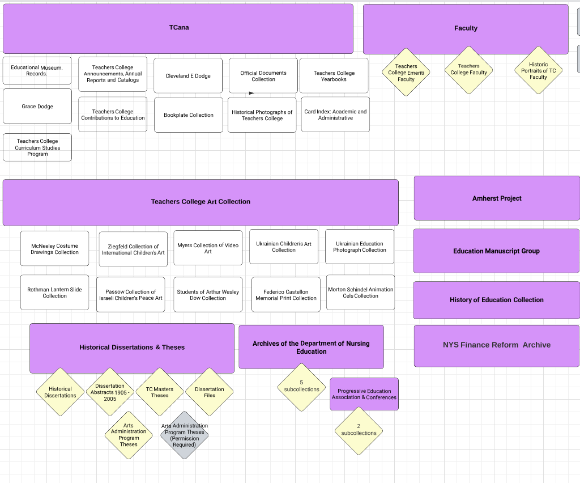
In accordance with general archival and special collection practices, bibliographic description is most detailed at the collection and subcollection level, while individual files contain the most basic metadata fields, likely composed of author/creator, date, and other metadata harvested from Pocket Knowledge. As we continue to iterate upon the collections, users can expect more granular metadata information to be added to item level records.
Migrating the metadata and content from PK led us to then configure and further consider the user experience, viewer services, and access rights. Alma offers multiple file viewers for digital objects. After testing and experimentation, we enabled the Alma Universal Viewer for image files. Based on IIIF (International Image Interoperability Framework), the Universal Viewer provides the most appropriate option for viewing high-resolution tiff and jpeg files. For PDF files, we enabled the Alma Viewer. The Alma Viewer presents the stored file and its corresponding metadata in a simple, sleek user interface, while accommodating additional file types such as streaming video.
In addition to configuring viewer services, we also configured the appropriate access rights necessary for our diverse and varied special collections. Within Alma, access rights grant or deny access to view and download Teachers College Digital Collections resources depending on the collection parameters, and a viewer’s registration status. Most collections are available for general public viewing, with download privileges reserved for the Teachers College community. Exceptions may exist in the case of embargoed collections, or digital collections still in process. Access rights and viewer services are both added to collections as they are imported, but can also be configured and changed after import as needed.
As an example, the current landing page contains four collections (image one). If a patron selects James E. Russell Collection, they will be taken to the sub-collection page which contains Series 3 Correspondence with Trustees (image two) which provides access to 1,133 items from that complete series (image three).
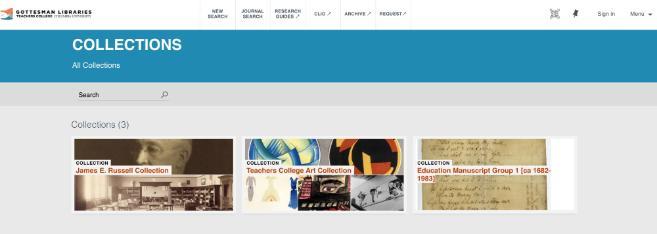
Image One
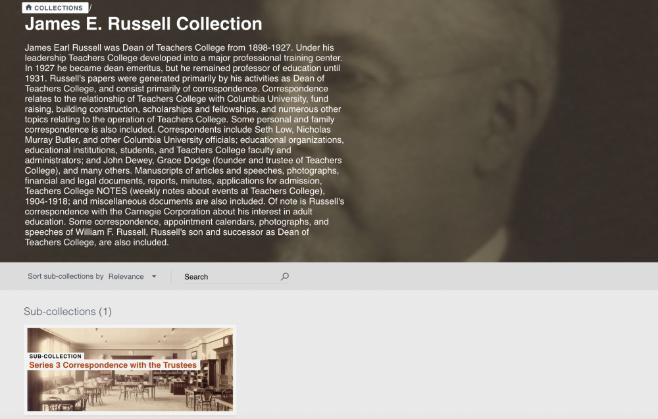
Image Two
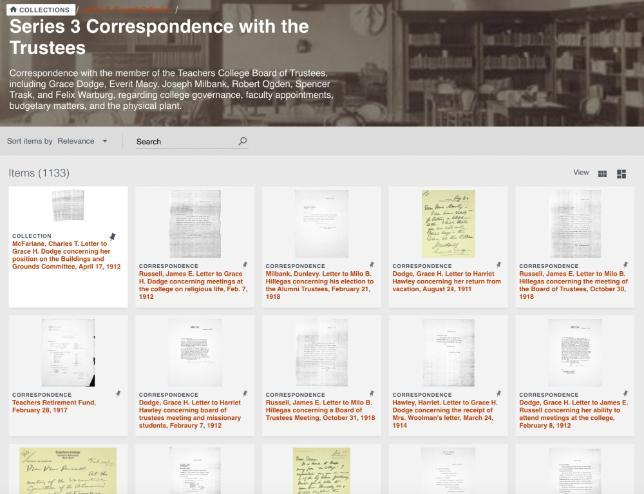
Image Three
Our hope is that the following four collections highlight not only the potential functionality of Alma Digital, but also a revitalized introduction to the type and breadth of content that the Special and Digital Collections of Teachers College has to offer its members, affiliates, and wider scholarly community. .
The Educational Manuscripts collection contains individuals from 17th through 20th century letters, essays, poems, speeches, sermons, reports, school records, legal documents, and miscellaneous documents relating to education. Notable educators include Horace Mann, Mary Tyler Peabody Mann, Henry Boyd Bode, Grace Dodge, August Hermann Francke, Frederick Froebel, Thomas Gage, Oliver Wendell Holmes, William James, as well as notable politicians of the Revolutionary Era.
Of the many important faculty and administrative figures involved with the formation of Teachers College, we chose to highlight Series 3 of the James Earl Russell Papers, as they provide important foundational information regarding the establishment of Teachers College as a preeminent educational institution, including correspondence with trustees regarding governance and faculty appointments.
To highlight Teachers College's significant art collection, we offer two timely and culturally significant collections, the Ukrainian Children’s Art Collection and Ukrainian Educational Photograph Collection. Each of these collections offer a unique and intimate journey through Soviet-Era social and cultural life in the Ukraine during the 1930s.
Please check back frequently as we continue to add collections.
LOOKING AHEAD
As the Gottesman Libraries staff moves forward with further iterations and enhancements of the Teachers College Digital Collections we foresee a great deal of potential. In order to further solidify the framework for the digital collections we will conduct usability tests conducted in collaboration with our community of users, further audit and compare our digital collections to their physical counterparts, incorporate digital-born acquisitions, utilize existing infrastructure and platforms to make our physical special collections more accessible, create workflows and procedures that reflect Teachers College and Gottesman Libraries commitment to equitable access, continue to curate quality content via our blog and instructional courses, and further facilitate the Mission, Vision, and Values of Gottesman Libraries.


